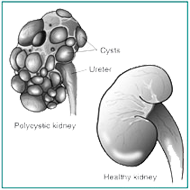|
|

| PKD HEALTH
Therapy for PKD is aimed at minimizing cystic growth, keeping cystic kidneys healthy and maintaining a healthy heart and vascular system. Working with our doctors, we can assist this by
• Eating a plant based alkaline diet
• Neutral protein 0.6 Grams/Kilogram
• Low sodium 1200 mg, low salt helps keep PKD'rs healthy
• Maintain alkalinity
• Control anemia
• Tight blood pressure control
• Diminish cyst growth
• Keep cystic kidneys small
• Increase blood flow to the kidneys
• Avoid kidney toxins aspirin, tylenol NSAIDs
• Limit exposure to cyclic AMP triggers.
• Limit any trauma to cystic organs
• Limit cyst rupture
• Take antibiotics when necessary
• Gentle exercise
• Diminish proteinuria
• Drink adequate water (possibly 3 liters) |
ALKALINITY Eat a low sodium plant based diet geared to kidney and liver health. Check urinary pH at night. Read about potassium citrate a potent alkalizer.
ANEMIA Correct anemia. Anemia puts an extra load upon the heart as the heart muscle pumps harder to circulate the anemic blood throughout the entire body. This forces a weak heart muscle to develop. In enlarging, the heart muscle becomes less efficient as a pump. This can lead to left ventricular hypertrophy, LVH, and an earlier death from heart disease; the most common cause of death from PKD.
BLOOD PRESSURE Maintain a consistent low blood pressure between 100/70 - 110/70 - 120/80. There is a five (5) year HALT PKD blood pressure study going on right now to see what the best blood pressure medication is for controlling PKD. ACE inhibitors and angiotensin receptor site blocking agents keep the kidneys bathed in a very good blood supply. A good nourishing blood abundant blood supply to the kidneys is key to keeping our cystic kidneys healthy. This is the conclusion following the CRISP study. To learn more about blood pressure control, see this page.
CYST GROWTH Do what you can to diminish cyst growth by controlling blood pressure; drinking water; avoiding caffeine in all its forms: chocolate, decaf coffee, green tea, colas; minimizing trauma to the kidneys; and treating infections early; minimizing kidney inflammation.
KIDNEY BLOOD FLOW Maintain a good blood supply to the kidneys. Rest when needed. Certain blood pressure medications increase kidney perfusion. Laying supine also increases kidney blood flow.
AVOID KIDNEY TOXINS Question all medicines and ask about an alternative for any that may cause less harm to your kidneys or liver. Articles on harmful kidney toxins are available here. For a list of herbs harmful to the kidney, try here. For a list harmful to livers, click here. Avoid over the counter preparations such as: aspirin, tylenol, NSAIDs, phenacetin, ephedrine compounds and more, click here. Avoid alcohol and caffeine.
EXERCISE Gentle non-contact-sports like walking daily is ideal for maintaining health. This aids the blood circulation; keeps the body toned; prevents osteoporosis; and helps keep a good blood flow to all the body organs including the kidneys. Running marathons, participating in triathlons, while vigorous, can cause the healthiest body to spill protein in the urine. With PKD we wish to diminish spilling of protein in the urine. Gradually work up to daily aerobic exercise increasing it steadily and checking for proteins in urine. Runners live longer with fewer disabilities. PROTEINURIA If present, diminish spilling of protein in the urine by controlling blood pressure and eating a neutral protein diet of 0.6 grams/kilogram of body weight. One can test urinary proteins with a dipstix called albustix available 100 for $35 through Canada. To read more about protein spillage in the urine try here.
WATER To read about as a possible treatment for PKD, click here. For more on bottled water, click here.
The above list of suggestions is based on shared anecdotal knowledge from amongst our mutual PKD experiences. We have come to learn through eating an alkaline diet, increasing water intake, decreasing salt and changing to a healthier lifestyle, sustaining low blood pressure, we can maintain the functioning of our cystic kidneys for a very long time, perhaps delaying the need for dialysis or transplant forever. Seek out an understanding nephrologist or a kidney specialist. Work with your doctor to help maintain the health of your cystic kidneys.
Among personal choices we can make, are which foods to eat: do we smoke? do we exercise? We can modify our exposure to chemicals and kidney toxins. We can adjust how much exercise we do. We can participate in self monitoring of our own blood pressure to keep handy clear records of our past blood pressure readings. We can decide how much water we drink. With guided attention from our personal physicians to these many details, we can exert some influence on polycystic kidney health, helping to assure we are counted amidst the lucky 40% of PKD'rs maintaining healthy polycystic kidneys throughout their lifetime.
A few examples of things that we cannot influence are if we are male or female. If we have been born male, high blood pressure and left ventricular hypertrophy LVH, these complications occur earlier. If we have been born female with liver cysts, a polycystic liver grows larger and can occur with greater severity among females. Both are thought to be the result of hormonal influences. We cannot influence if we have inherited PKD1 or PKD2. PKD2 has a delay of symptoms perhaps by 12 years. There is some talk that there might be a PKD3 gene, but no one knows. The PKD Polycystic Kidney Disease gene runs in families.
ARPKD Autosomal Recessive Polycystic Kidney Disease is another form of PKD. Both parents have the recessive gene, yet neither parent manifests any symptoms of PKD |
|
|